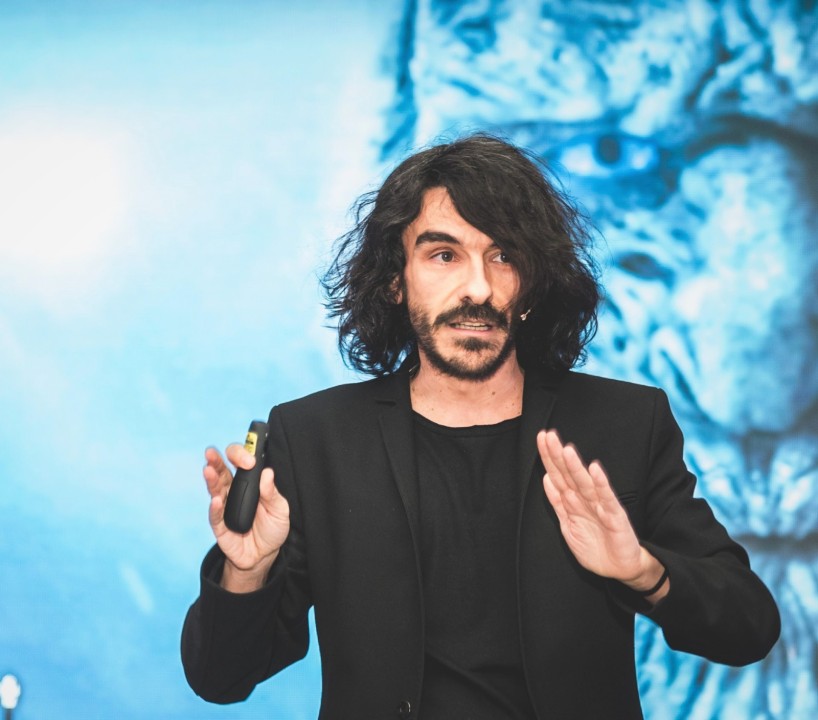Jaime García Cantero
Ballot boxes and guns. Half of the planet will be called to the polls in 2024 while the world is still at war. Technology, and most especially Artificial Intelligence, can determine the outcomes in both. DeepFakes and cyberattacks. Algorithmic manipulation and digital terrorism. The old order is ending and the new one is slow in coming, and as Antonio Gramsci warned, “In that chiaroscuro monsters emerge”.
Harvard professor Svetlana Boym explained that the 20th century began as a futuristic utopia and ended in nostalgia. Technology was undoubtedly an integral part of that utopia, but now that that future seems to have reached us and robots, self-driving vehicles or the global village dreamed of by Mcluhan have become a reality, our vision is far from the happy future predicted by the integrated and there are more and more apocalyptics, following Umberto Eco’s dichotomy, who cry out against the unstoppable technological advance. Some, as Zygmunt Bauman explained in his posthumous work, have even fallen into retrotopia, building the utopian not forwards but backwards, making nostalgia for a past that never existed, an excuse for immobilism and, in the worst cases, a banner for those politics of hate that are appearing today in all latitudes.

But this is not about stopping technology, but about advancing it in a different way. The same Artificial Intelligence that builds fake news has been able to discover the structure of 200 million proteins and put this knowledge at the service of the scientific community. These same algorithms are being key in the discovery of new antibiotics that will save millions of lives or in the fight against climate change. The problem is not artificial intelligence but the use we make of it.
Let us recover the vision of technology as a tool for progress. Let us invest in impactful research and purposeful technology, that which solves relevant problems in a responsible manner. We have a major opportunity in front of us. A powerful tool for a better tomorrow. But this opportunity is not a blank check but a red sheet. As Miguel Delibes used to say, in a booklet of paper all the pages are white until a red one announces that there are only five left. It is the beginning of the end. The sign that something is coming to an end. This is not our first chance, but it may be our last. The time is now. The decisions we make in this 2024 that is beginning will mark the next decades. As Ortega y Gasset said: “If we do not decide, others will do it for us, surely against us”. In an environment of complexity, the future is not built, it is woven. The cathedral that we will leave to those who will come must grow like a bazar. Plural, decentralized, complex and alive. Another model is possible. That of technology with purpose that does not make millionaires of 0.1% of the population but improves the lives of the other 99.9%. A fair, inclusive and sustainable digitalization that puts people at the center. A transformation that builds a learning society, which, as Joseph Stiglitz explained, understands that knowledge, innovation and science are the only guarantee of sustainable growth and job creation.
It is not a world war, but it is a world at war
The Uppsala Conflict Data Program, which has been tracking wars worldwide since 1945, identified 2022 and 2023 as the most conflict-ridden years in the world since the end of the Cold War. One in six inhabitants of this planet we call our own was exposed to armed conflict in 2023. A staggering number of armed conflicts have started, restarted or escalated in the last 24 months. Some were frozen, others had been simmering for years. All have now become active. The list includes not only the wars in Gaza and Ukraine, but also the Serbian military action against Kosovo, the hostilities between Armenia and Azerbaijan in Nagorno-Karabakh, the fighting in eastern Congo, the complex situation in Sudan since April or the fragile cease-fire in Tigray that Ethiopia seems ready to break at any moment. Syria and Yemen have not exactly been quiet during this period. Distant war drums are beating in East Asia, with the continuing threat of China invading the island of Taiwan, the epicenter of global microelectronics, or the dire consequences of a possible Venezuelan occupation of the Esequibo. Gangs, maras or cartels continually threaten governments such as those of Haiti or Mexico. War is no longer a state monopoly. The “deregulation of the use of force“, forged during years of erosion of international norms, crystallizes into new threats. In just 12 months, political violence in the world has increased by 27%.
The impact of this situation on the technological environment is evident. Retina observatory experts point to the geopolitical situation as the greatest risk to slow down investments in innovation and digital transformation. Although this impact is highly asymmetric. The observatory points to the security and defense sector as a priority investment sector for 2024 and they see cybersecurity as one of the priority technological vectors for the year ahead.
In May last year I interviewed the Prime Minister of Estonia, Kaja Kallas. Her view was clear: “When the war between Ukraine and Russia ends in the physical world, it will continue for years to come in cyberspace.” But beyond this immediate impact on defense innovation, with its potential dual-use applications, and on cybersecurity technologies, this pre-war context reopens two recurring themes in global geostrategy with high impact on innovation and digital transformation: global governance and strategic sovereignty. The multilateral global governance model of 1945 has become obsolete. Today’s world does not resemble yesterday’s. The 21st century is marked by the confrontation of a rising power, China, and a consolidated power, the USA, both of which have become enormous technological powers with opposing models, but with similar effects on the rest of the planet. For this reason, as opposed to the Chinese D of Domination, with an all-powerful and controlling state, and the D of American Darwinism, in which the markets, and only the markets, impose their law, a third D is needed, that of rights, which Europe seems to represent. The law on digital services or the recent proposal for a law on Artificial Intelligence could lead the way. The digital sphere must cease to be the Wild West. Technology, and especially artificial intelligence, is, as Cathy O’Neil said, a “weapon of destruction” for our democracies, which will undergo a huge stress test in 2024.
Vote, vote, vote, damn you….
More than half of the planet will vote in 2024. The polls will be open in 76 countries representing 51% of the global population. However, in at least half of these states they are unlikely to lead to significant changes in the structure of those in power, because the consultations will not be free or truly democratic, given the laws against freedom of expression or association present in many regimes.
In addition to the European elections, which could paradoxically lead to an anti-European parliament, votes will also be cast in eight of the world’s ten most populous countries: Bangladesh, Brazil, India and Indonesia, Mexico, Pakistan, Russia and the United States, and in 18 African countries totaling 300 million voters for a total of almost 4,000.
However, as The Economist pointed out, of the 71 countries that vote, only 43 will have fully free and democratic elections: in the other 28 the vote will be of little use. No one expects any surprises in Russia, where Vladimir Putin’s re-election is certain, or in Iran. In the technological field, in addition to the European elections, the elections in Taiwan will be particularly important, as the election year begins on January 13, 2024, with a vote that will mark the future of its relations with China and could mark a substantial change in its chip export policy, and also those that will close the year in the USA, where a possible return of former President Donald Trump could trigger unpredictable reactions all over the world.
But the impact of elections on technology also works in the opposite direction. As the Brexit vote or the elections in Brazil or earlier in the US already demonstrated technology plays an increasing role in voter choice and this is something that artificial intelligence could dynamite. “Over the past year, this new technology has been used in at least 16 countries to sow doubt, smear opponents or influence public debate,” warned the 2023 edition of the Freedom on the Net report produced by the non-profit Freedom House. Its use in 2023 has skyrocketed. Recent elections in Argentina were marked by the widespread use of AI in campaign material. Generative AI has also been used to manipulate voters in India, the United States, Poland, Zambia and Bangladesh.
Artificial intelligence, with its enormous capacity to generate inequality between those who use it and those who don’t, and its potential to make truth indistinguishable from lies, can take polarization to the extreme. Inequality and DeepFakes are gasoline for the fire in which we live, and they pave the way for those new fascisms that plague the planet. Scared and angry white men who can vote an anti-European parliament to run the old continent or put at the head of the USA the individual who encouraged the violent assault of their congress. But all is not lost. As Cortázar wrote in those chapters of Rayuela that you could not read, “nothing is lost if you finally have the courage to proclaim that everything is lost and that you have to start again”. A good principle may be not to hold artificial intelligence in particular and technology in general responsible for all our ills.
Don’t blame the algorithm
Artificial intelligence is the most powerful technology in the history of humanity, because it does not question what we do, but what we are. We cannot oversimplify or use it as an excuse or justification for evils that have been with us for years, as Virginia Eubanks warned in her magnificent The Automation of Inequality. AI could help humanity to solve some of its most pressing problems and it will do so in a very specific way: by radically accelerating the pace of scientific discoveries, especially in areas such as medicine or the fight against climate change. In contrast to the catastrophism and apocalyptic vision of those calling for a halt to AI, experts such as Demis Hassabis and Yann LeCun believe that it could lead to a golden age of scientific research.
But the possibilities of building a better world go beyond science. Intellectuals and economists such as Aaron Bastani or Nick Srnicek see automation and the use of AI as a lever to transform employment, redistribute work and achieve a minimum living income. Let’s not let the apocalyptics be right, let’s lay in this 2024 the foundations of a better future in which we regulate and put artificial intelligence at the service of people.
Stay up to date about everything
Subscribe to stay up to date with the latest content from Mobile World Capital Barcelona.
